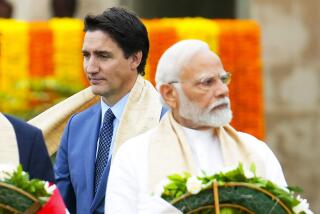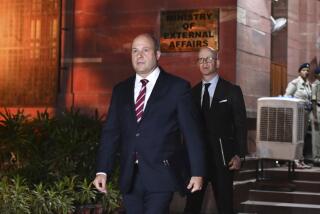Canada Rejects Terror Charges
- Share via
UNITED NATIONS — The Canadian government, saying one of its citizens was unfairly targeted by the American-led anti-terror campaign here, said Monday that it will ask the Security Council to remove the man’s name from its list of accused Al Qaeda accomplices.
Liban Hussein, a 31-year-old Somalia-born Ottawa businessman, was among 220 people named publicly by the Security Council last fall as key members or financial backers of Osama bin Laden’s global terrorism network. In accord with binding U.N. resolutions, Canada immediately arrested Hussein and seized his financial assets.
The U.N. named Hussein as an Al Qaeda supporter at the request of the United States, which had said that he and his Boston-based brother had helped underwrite terrorist operations through an unregistered international money- transfer business.
But on Monday, the Canadian government said it could find no evidence to support the allegations. It dropped all charges against Hussein, released funds that were frozen in his Canadian bank accounts and announced that it would not honor a U.S. extradition request. Hussein had been out on bail, awaiting the extradition proceedings.
“Based on a full and thorough investigation of the information collected in relation to the extradition proceedings, the government of Canada has concluded that there are no reasonable grounds to believe Mr. Hussein is connected to any terrorist activities,” the Foreign Ministry said in a statement.
It said U.S. officials had been informed of the extradition decision and “indicated they do not object.”
Last month, Hussein’s brother Mohammed was convicted in a Boston court of operating a business without a state license and illegally sending money abroad. But prosecutors never filed terrorism-related charges against either brother.
Canada’s action marked only the second time that a U.N. member has openly questioned the Security Council’s listing of accused Al Qaeda members and benefactors. Earlier this year, Sweden complained about the inclusion of three Somalian immigrants from Stockholm who, like the Husseins, ran a money-transfer business with partners in Mogadishu, the Somalian capital.
Swedish diplomats said the men had protested their innocence and were unable to obtain any details about their alleged involvement with Al Qaeda. But in a closed-door meeting, diplomats and U.N. officials said, the United States and at least two other Security Council members argued that all three Swedish residents should remain on the list.
The U.N. list--which contains 72 charities and businesses, 152 former Taliban officials and 68 other individuals accused of Al Qaeda-related activity--was compiled on the basis of information provided by the CIA and other Western intelligence agencies. Any member of the Security Council can add names to the list provided that other members do not object. Some European governments and human rights groups have complained that evidence may never be disclosed and that even the process for exonerating the falsely accused is kept secret.
More to Read
Sign up for Essential California
The most important California stories and recommendations in your inbox every morning.
You may occasionally receive promotional content from the Los Angeles Times.













